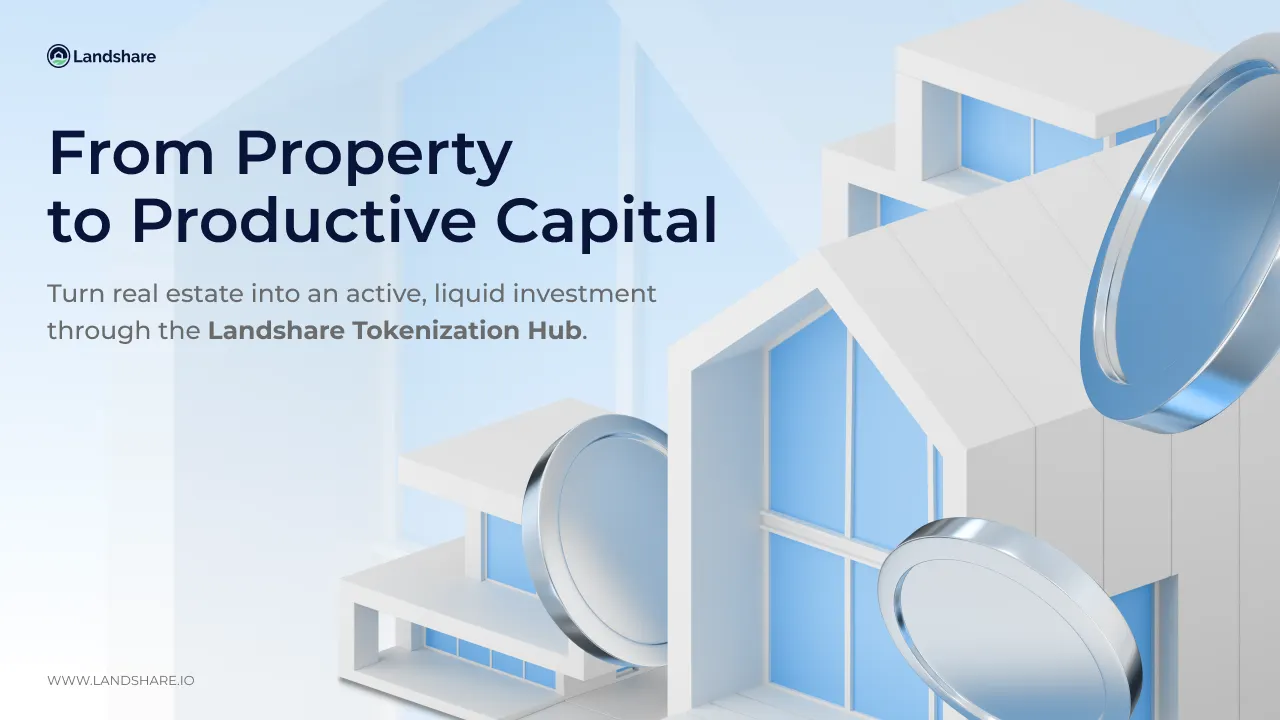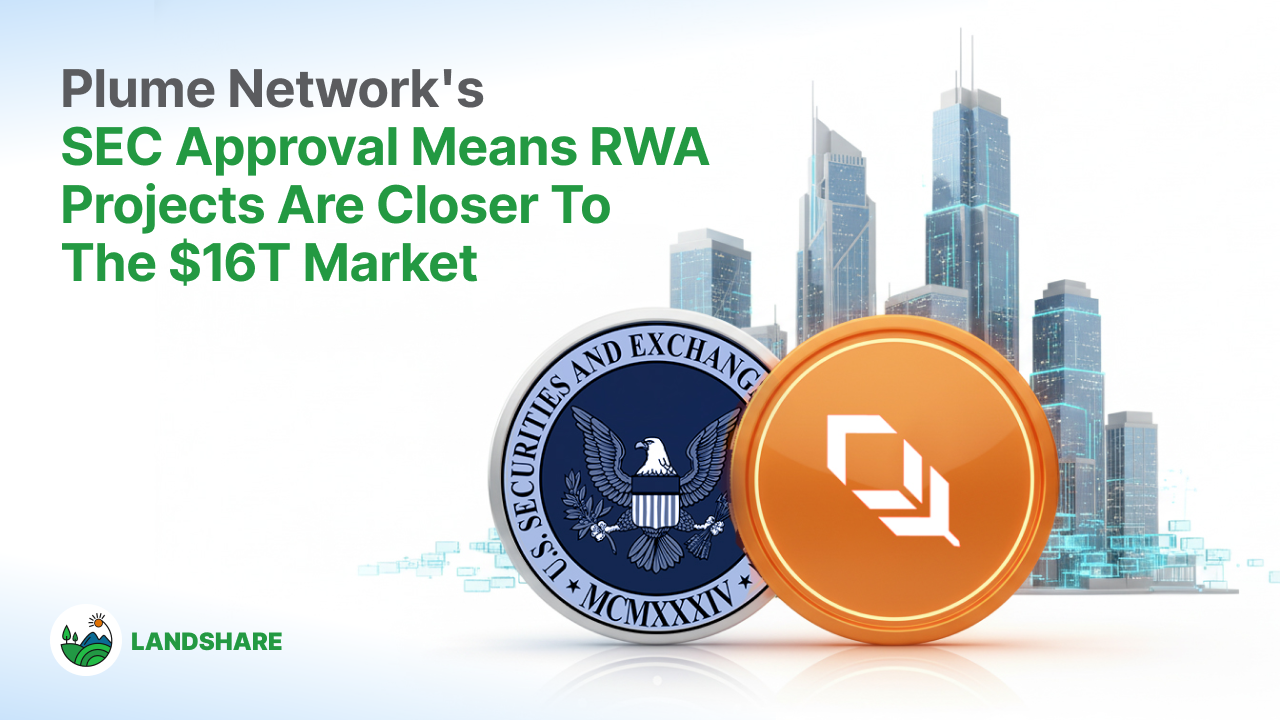8 Reasons Why Real Estate Tokenization Benefits Property Owners
Landshare Team

What comes to your mind when considering whether there will be an increasingly high demand for real estate properties with time? The answer should be affirmative since we know that land is a finite resource, and so are properties. This more was needed to drive the demand for real estate properties, at least not for another century. However, property owners do not need to worry since real estate tokenization solves this issue.
One of the most effective use cases of blockchain technology—tokenization—has shown impressive results and assured a bright future. Real estate tokenization was among the first implementations of the technology, and it was indeed successful. McKinsey, a global management consulting firm, estimates that the volume of tokenized digital securities will hit $5 trillion by 2030, while other reports suggest that real estate tokenization will have a significant share in it.
A Boston Consulting Group (BCG) report showed that the market size of the tokenized real estate sector in 2022 was $2.7 Billion. However, it is expected to reach $16 trillion by 2030. Such huge numbers are only possible with supply meeting demand. Tokenization brings enormous possibilities, and property owners can now be assured of potential increased demand for tokenized real estate properties.
We must investigate the reasons that are expected to increase the demand for tokenized real estate. Let’s do this by first understanding what tokenization means.
What Is Real Estate Tokenization?
Tokenization is the digital representation of assets on blockchain networks. Real estate tokenization does the same by representing property value through blockchain-based tokens. After tokenization, the real estate sector experienced remarkable changes, as it eliminated inherent flaws and brought some unique features.
Real Estate Tokenization Pushes Demands in Market
The benefits, including rational ownership, increased liquidity, transparency, and security, place tokenized real estate ahead of the traditional market. Investors and property buyers are drawn towards tokenized real estate due to these offerings and likely to increase the demand in the contingency.
The demand for real estate investment has continued to grow. According to KPMG, the global commercial real estate investment hit $830 billion in 2019, demonstrating growing interest. On the other hand, average investors have been massively included in the real estate market because of some practical ways to invest, such as Real Estate Investment Trusts (REITs). The S&P Global REIT Index has seen notable growth in the past few years, indicating the rising demand for real estate investment.
Tokenization offers a more democratized way of investing in real estate, ensuring a huge future demand. Let’s delve into the offerings of tokenized real estate to understand why it could drive more demand:
Accessibility to Small Investors
Fragmentation or fractional ownership of real estate properties through tokenization not only makes it possible for small investors to participate but also empowers them. By making tokenization accessible to small investors, tokenization opens up a vast pool of untapped interested buyers. Once this crowd enters the space, the real estate market could see unprecedented demand, giving small investors a significant role to play.
Tokenization is often hailed as the 'democratization of the real estate sector '. This term refers to the idea that tokenization can make real estate investments more accessible to a wider range of investors, not just the ultra-wealthy. Many reports show that ultra-high-net-worth individuals (UHNWI), a term used to describe individuals with a net worth of over $ 30 million, prefer real estate investments for stability, cash flow, appreciation, and diversification. According to Tiger 21, a network of UHNWI entrepreneurs and investors, about 27% of these HNIs' investment portfolios consist of real estate investments.
If given opportunities, small investors are likely to follow the HNI investment strategy to benefit from the stability, cash flow, and appreciation of the real estate sector. Tokenized real estate provides many investors with an opportunity to enter the market.
Minimum Required Investment
Traditional real estate markets have always had a barrier to entry, given the requirement of high capital to invest. This has restricted small investors from entering the market, but tokenization solves this. Tokenized real estate properties are divided into small units and become affordable even for retail investors.
The low threshold for entering the real estate investment market has allowed many investors to enter, which was never possible earlier. There are numerous active projects in the tokenized real estate market that facilitate real estate investment with as low as $50. In comparison to traditional real estate, which might require from $100K to $1 Million, depending on the property, there are enormous possibilities in the tokenized real estate market.
Global Reach Brings Investment Options
Tokenization doesn't just allow investors to invest in real estate in any corner of the world, it opens up a world of possibilities. This global reach liberates investors from the limitation of investing in regional properties, offering them the excitement of exploring international properties with the possibility of a better return on investment and rental income yield.
Several studies show that nearly 90% of all US-registered real estate properties are accessible only to accredited investors. This shows that many investment options are only available to a small number of investors.
For instance, if you are an aspiring real estate investor from Indonesia, you can invest in tokenized real estate based in the United States. This access to international real estate properties was unimaginable until tokenization.
High Liquidity
In tokenization, real estate properties are turned into tokens that investors or property buyers can hold. These tokens can then be easily traded to other investors. This easy and quick selling and buying of tokens not only makes the tokenized real estate sector highly liquid but also provides property owners with a sense of security, knowing that they can receive cash in exchange for their property or part of it quicker than they could traditionally.
Property owners can receive cash in exchange for their property or part of it quicker than they could traditionally. Investors or buyers are also not burdened with carrying the investment for long periods.
Easy Property Management
Blockchain technology plays a significant role in the easy management of real estate properties with the help of smart contracts. Tokenized real estate properties do not need intermediaries to carry out the transactions. Self-executable smart contracts take care of the property transactions once the conditions are met.
Transparency
With blockchain technology comes the assurance of security and transparency. As smart contracts take care of the process, participants can see the whole transaction by themselves and see if everything is going according to plan. Due to the immutable nature of blockchain networks, it becomes nearly impossible to alter the transactions.
Transaction Cost
Since buying and selling tokenized real estate property is digital, it does not require paperwork, bureaucracy, or other requirements that increase transaction costs. The automated process keeps the cost minimal, making the transaction affordable.
KPMG study finds that a significant amount of time and money goes into a real estate transaction. Such transactions could sometimes take six months to 2 years and 1% to 3% of the assets’ value in fees, depending on the property. Tokenized asset transfers get done quickly and at a much cheaper rate.
Secondary Market Trading
Traditionally, real estate markets are illiquid, and it might take months to sell or resell your property. In tokenized real estate, however, since investors purchase the tokens, they can easily sell these tokens further to other investors or in the secondary market.
The real estate market has this limitation, but asset-backed tokens are easily tradable, further enhancing liquidity.
Landshare Extends Hands to Property Owners
Landshare offers the ultimate real estate tokenization services that ensures investors as well as property owners get most benefits. We ensure all the features and offerings mentioned above available on the platform. Providing access to retail investors, accessibility to international real estate, high liquidity, transparent process, low transaction cost and secondary market trading, Landshare is committed to cater both ends in the real estate market: investors and property owners.
In the End
We have explored that tokenization of real estate is more than just a fleeting trend; it is a transformative innovation reshaping the market. With enhanced accessibility for retail investors to global reach and high liquidity, tokenization is smashing long-standing barriers.
The integration of blockchain technology makes the process transparent, secure, and efficient by reducing transaction costs and simplifying property management using smart contracts. Indeed, the future is digital, and the real estate sector is still catching up with the trend. Property owners can leverage tokenization and look forward to an emerging market that is more inclusive, efficient, and dynamic.
About Landshare
Landshare is a U.S.-based platform dedicated to the tokenization of real estate properties. It enables investors to acquire fractional shares in residential properties using blockchain technology, streamlining the investment process and broadening the scope of who can invest in real estate. By integrating blockchain technology into the real estate market, Landshare offers tokenized property assets on its platform, making it possible for investments to start at just $50, thus democratizing the entry into property investment.
The platform employs Real World Asset (LSRWA) tokens, granting investors partial ownership in tangible property assets and marking a notable innovation in real estate investment. Landshare's utility token, LAND, has demonstrated its transactional effectiveness by successfully selling four tokenized properties on the Binance Smart Chain (BSC), affirming its readiness for the market. Addressing the traditional inefficiencies and liquidity issues in real estate, Landshare positions itself as a critical player, offering promising prospects for growth and passive income generation.
Landshare October Recap
Landshare Team
October was a milestone month for Landshare – one that set the stage for the next era of on-chain real estate. From the official Landshare v2 announcement to new ecosystem updates, governance decisions, and exciting community initiatives, we’ve laid the groundwork for a future defined by growth, utility, and innovation.
This month, we introduced the framework that will redefine how investors, property owners, and DeFi users interact with real estate on-chain. Let’s recap the highlights 👇
Landshare v2 Announcement
The official unveiling of Landshare v2 signaled the start of a new chapter – one built around real utility, real yield, and real scalability.
Landshare v2 isn’t just an upgrade. It’s the foundation of a self-sustaining ecosystem where tokenized real estate finally reaches its full potential. The new system transforms stable assets into active yield-generating opportunities, seamlessly connecting traditional markets to DeFi.
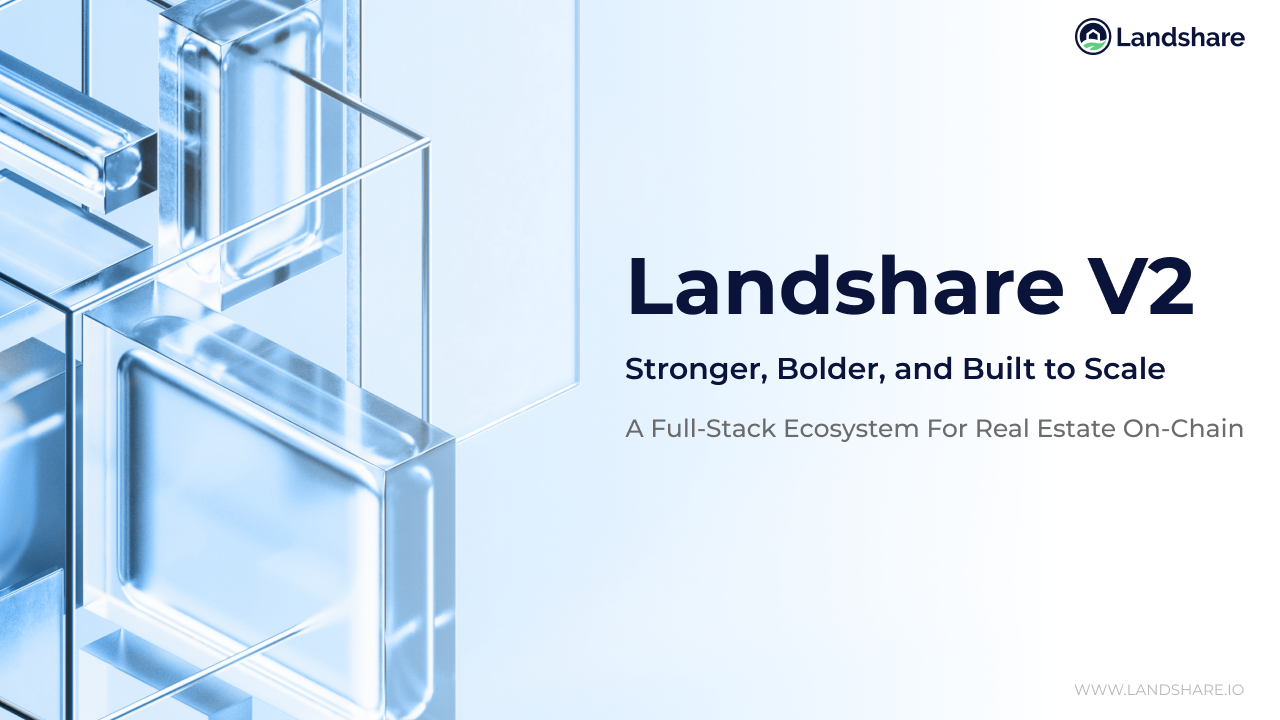
The Three Pillars of Landshare v2
In our follow-up deep dive, we explored the three core pillars that form the foundation of Landshare v2:
- The Real Asset Vault (RAV): A seamless gateway for stablecoin holders to earn real yield backed by tokenized properties.
- The Tokenization Hub: A complete solution for property owners to bring their assets on-chain.
- The DeFi Suite: Tools and incentives that amplify participation and utility across the ecosystem.
Together, these pillars create a self-sustaining growth loop, where every user and property strengthens the entire network.
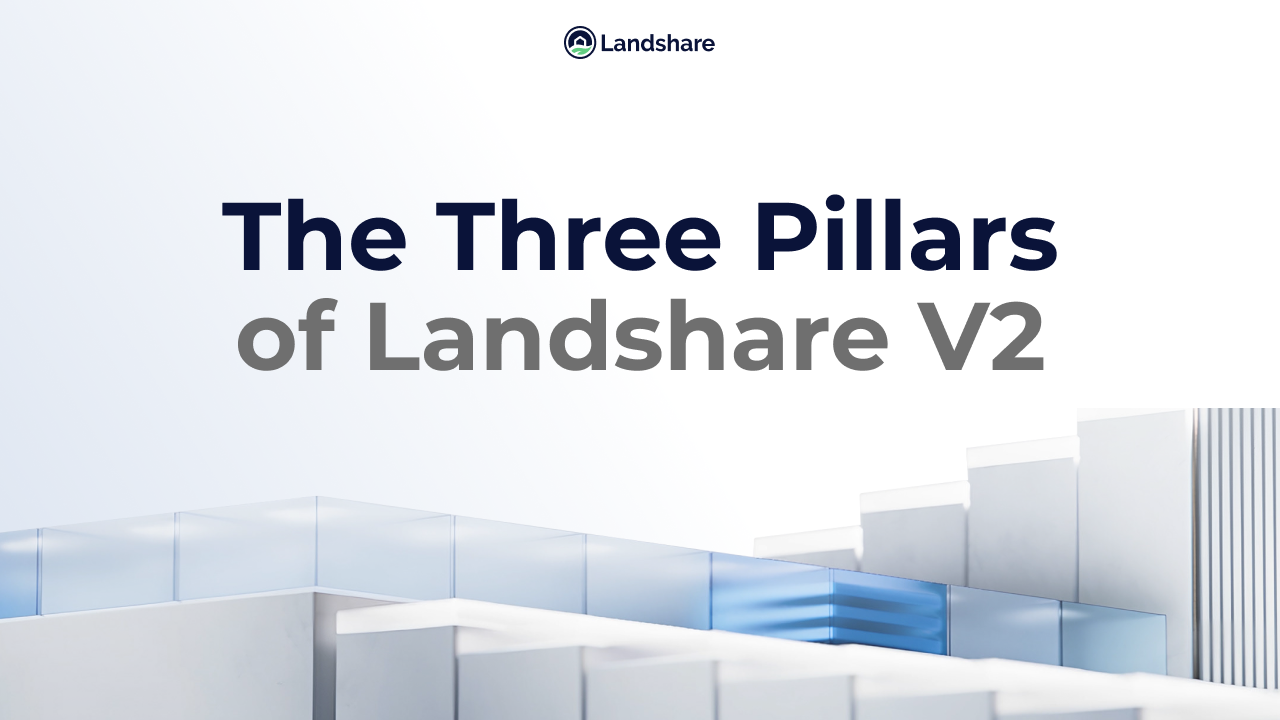
DAO Proposal Passed
In late October, the community voted to reduce LP emissions by 50% across both the LAND–BNB and LSRWA–USDT pools – with the proposal passing at 62.28% in favor.
This important step helps:
✅ Reduce daily LAND inflation
✅ Strengthen token scarcity and price stability
✅ Extend the reward pool lifespan
✅ Encourage long-term liquidity participation
The change will take effect within 48 hours of approval and marks another move toward a more balanced, sustainable economy for Landshare v2.
🗳️ View the full proposal and results
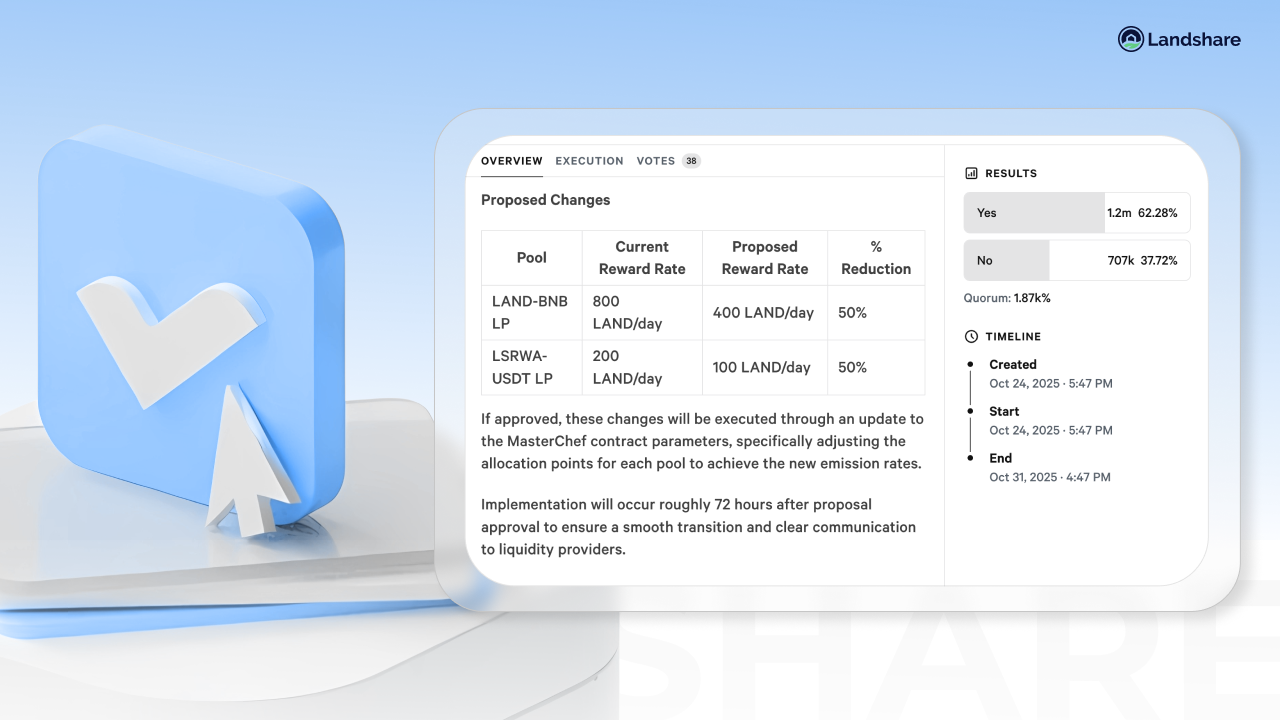
Tokenization Hub Breakdown
We released a comprehensive guide to the Landshare Tokenization Hub, explaining how property owners can now go beyond simple tokenization to access real investors, liquidity, and on-chain utility.
The Hub bridges traditional real estate with blockchain finance – creating a pathway for real-world assets to generate ongoing yield, transparency, and accessibility.

4.5M+ LAND Staked
October also marked another key milestone – over 4.5 million LAND tokens (nearly half of the total supply) are now staked in vaults. This incredible community achievement reflects growing confidence in Landshare’s long-term vision and token utility.
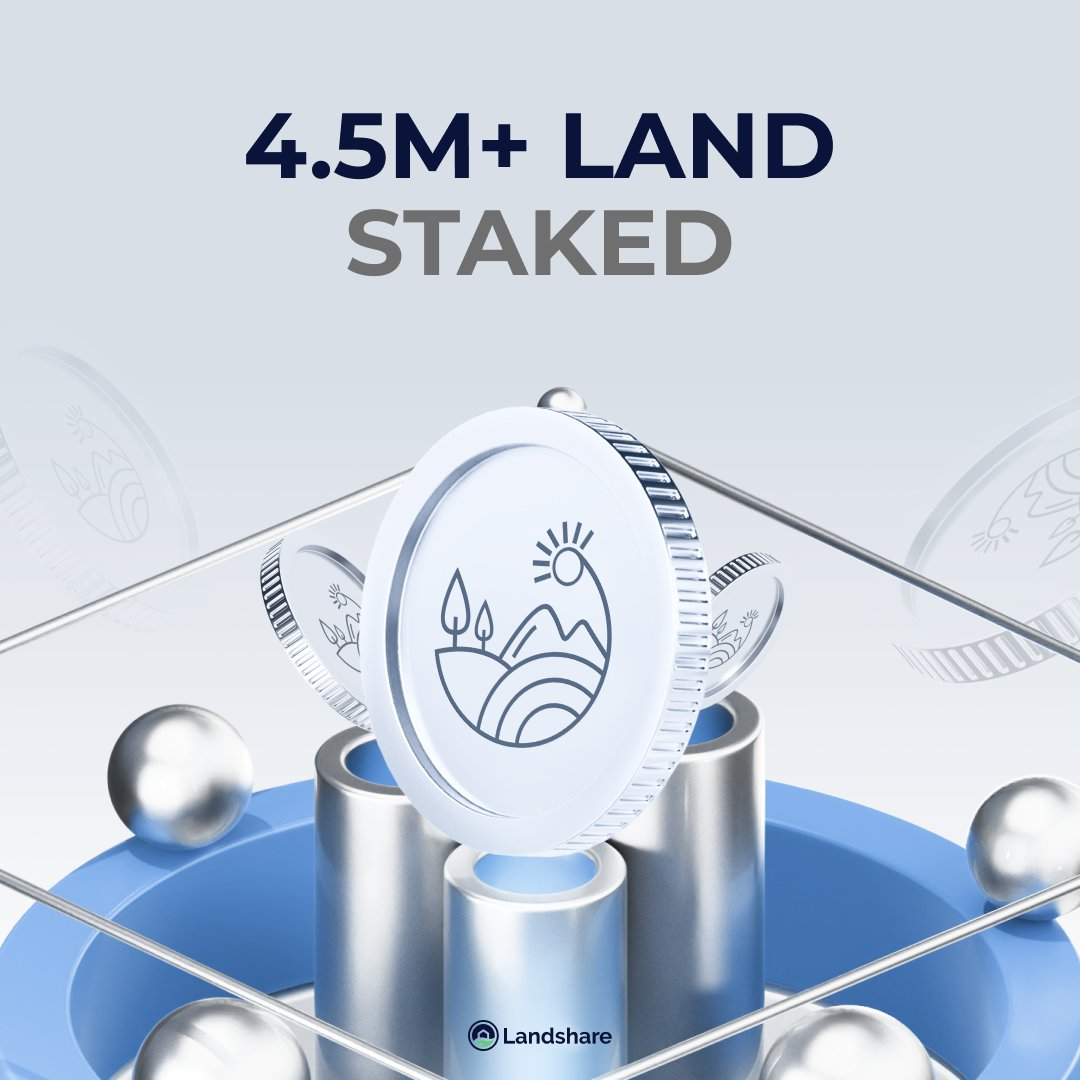
Community Townhall Incoming
We’re excited to announce our next Community Townhall, happening Thursday, November 6 at 12 PM CST or 6 PM CET on X Spaces!
Join Jordan (CEO), Travis (Co-Founder), and Ivan (CMO) as they discuss everything happening with Landshare v2, recent DAO proposals, and take your questions live.
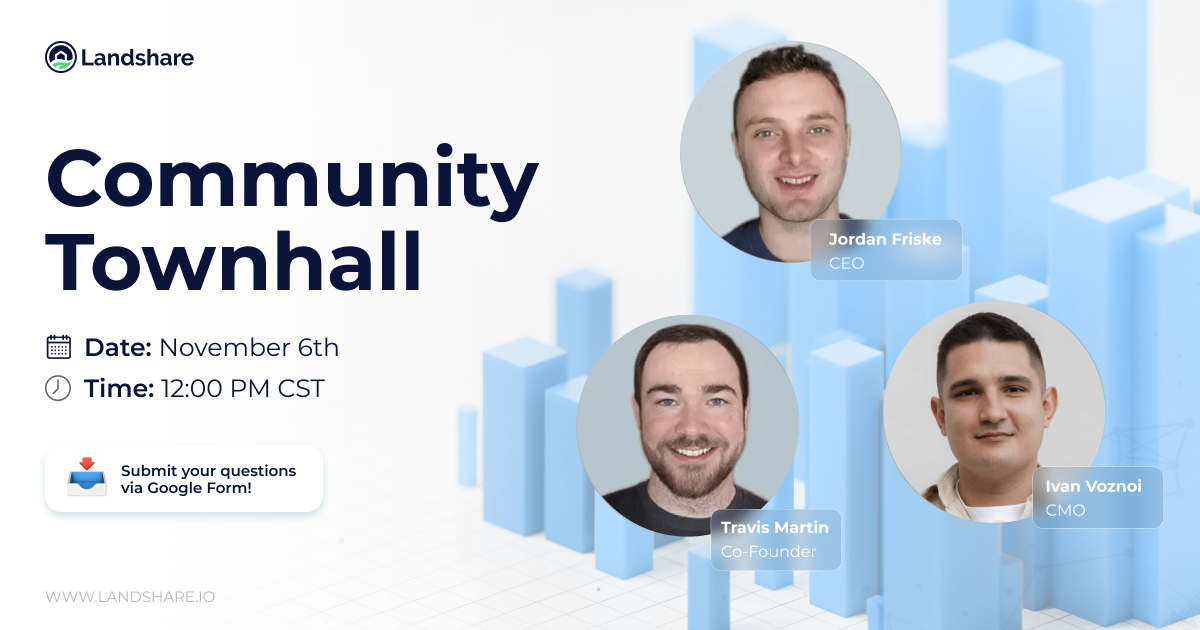
Looking Ahead
With Landshare v2 on the horizon, the foundation is set for a new phase of growth and adoption. In the coming weeks, we’ll be sharing more details on the RAV launch, the Points Campaign, and other major milestones driving our ecosystem forward.
Stay tuned – the future of real estate is being built on-chain, and we’re just getting started.
Tokenization Hub Breakdown
Landshare Team
Real estate tokenization has been a buzzword for years. Yet in practice, most projects have failed to move beyond press releases and empty promises. Too often, blockchain has been used as a veneer to package illiquid or low-quality assets, leaving investors with tokens that serve little purpose and property owners with no meaningful results.
Without investors, liquidity, or secondary markets, tokenization becomes little more than an on-chain spreadsheet — a digital record of ownership that no one can trade or invest in. For property owners, that means time and money spent “tokenizing” without achieving key goals: raising capital, expanding visibility, or unlocking value.
A Smarter Path Forward
For real estate tokenization to truly work, it needs to deliver tangible investment outcomes. After years of building and refining on-chain real estate products, Landshare has developed a model designed to do exactly that.
The Landshare Tokenization Hub transforms tokenization from a passive concept into an active investment process — connecting high-quality properties with real investors, liquidity pathways, and a live blockchain economy.
The Tokenization Hub Solution
Most platforms stop once a token is created. Landshare’s Tokenization Hub goes further , offering a complete pathway for property owners to bring their assets on-chain and immediately engage investors.
Each project is structured for success from day one, with:
- Customized tokenization models tailored to each property
- Transparent fundraising mechanics with defined soft and hard caps
- Built-in integration with the broader Landshare ecosystem
By connecting directly to Landshare’s existing network of investors and DeFi infrastructure, offerings can attract participation as soon as they launch. Once a fundraising goal is met, property tokens are deposited into the Landshare RWA Pool, linking them to ongoing liquidity, yield mechanisms, and secondary market exposure.
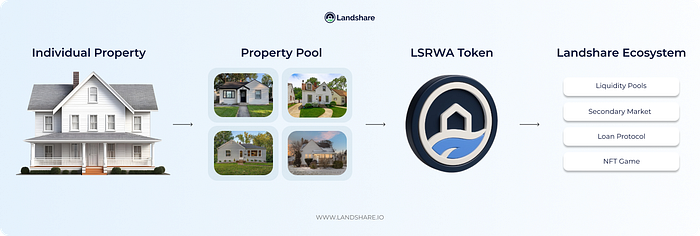
Why This Model Delivers Real Results
Where others leave property owners to manage marketing, compliance, and liquidity alone, the Tokenization Hub handles these as part of a unified process. This integration dramatically increases the likelihood of meeting fundraising goals and sustaining long-term engagement.
Integration with the Landshare RWA Token (LSRWA) is central to this model. Rather than isolated tokens with no market, each property becomes part of a shared, liquid environment that generates yield and investor participation. Individual assets can still be represented, extracted, or traded independently when needed.
For example, a multifamily property owner might tokenize 20% equity to raise $500,000 on-chain, connect the asset to the RWA Pool for ongoing yield, and maintain full transparency for investors — all within a compliant, accessible framework.
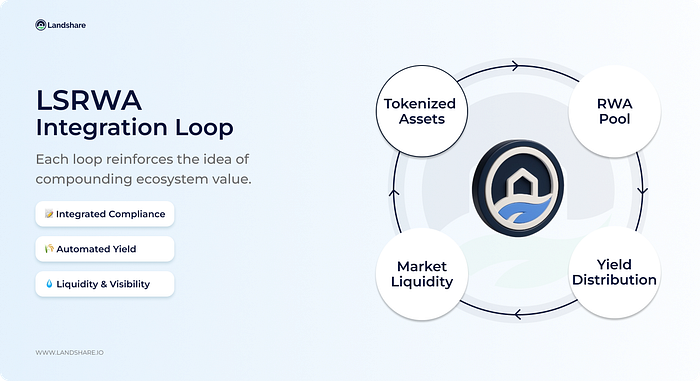
How It Works
- Tokenize the Property: Landshare collaborates with property owners to create a digital representation of equity, income rights, or hybrid participation.
- Launch the Offering: The property is listed on the Tokenization Hub with defined terms, caps, and transparent investor access.
- Fundraising & Validation: Investors participate directly on-chain. Once the soft cap is reached, funds are secured and the offering is finalized.
- Ecosystem Integration: Tokens are deposited into the Landshare RWA Pool, and investors receive LSRWA tokens representing pooled value and yield potential.
- Ongoing Value Creation: Property owners gain lasting benefits through liquidity, visibility, and investor engagement. As new assets are added to the pool, owners can rebalance between equity and cash, making real estate a more dynamic and liquid asset than ever before.

Built for Real-World Impact
The Landshare Tokenization Hub is more than a technical service — it’s a complete ecosystem designed to make real estate investment active, liquid, and accessible.
For property owners, it offers a streamlined way to raise capital and connect with global investors.
For investors, it provides exposure to yield-generating, on-chain assets backed by transparent real-world value.
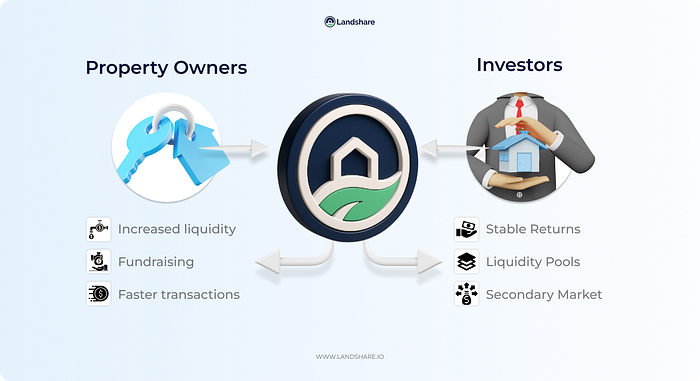
In an industry crowded with static tokens and overhyped promises, the Tokenization Hub delivers what tokenization was always meant to achieve — real outcomes, real liquidity, and real-world results.
🏡 About Landshare
Landshare is a tokenized real estate ecosystem that enables seamless investment in real-world assets on the blockchain. With Landshare, you can own a share of a real-world property simply by holding our RWA Tokens ($LSRWA). Our platform offers a secure, transparent, and efficient way to invest in real estate without traditional barriers.
- Website: landshare.io
- Twitter: @Landshareio
- Community: t.me/landshare
Plume Network's SEC Approval Means RWA Projects Are Closer to the $16T Market
Landshare Team
On October 6, Plume Network announced on its social media that it had been approved to be an SEC-registered transfer agent. This is a big milestone for the RWA industry, signaling that the traditional financial system is welcoming tokenized assets.
Transfer agents basically manage important back-end work and are the official record-keepers for securities issuers. So, essentially, they maintain shareholder registries, record ownership changes, issue certificates, and handle other corporate actions.
Plume’s approval means these critical functions can now be managed on-chain for tokenized securities. This is a pretty big deal, as it gives Plume and its users formal regulatory standing under U.S. law for on-chain securities.
Experts believe that this approval can boost the global RWA market, and top players like Landshare can benefit from it due to the increased regulatory clarity.
Why is the SEC’s Approval Important for Plume Network?
So, first, understand the roles of a registered transfer agent to get a better understanding of its importance.
In traditional finance, a transfer agent is usually a company or bank that tracks who owns a company’s securities and facilitates trades. They ensure every share transfer, stock split, or dividend payment is accurately recorded and reported. Now, let’s understand how this traditional role will work in the world of blockchain.
Post Link
By replicating these roles on-chain, Plume’s platform can securely log every token sale or dividend distribution in an immutable ledger, while also syncing with regulators. As Plume explains, its transfer-agent protocol will “link cap tables and reporting directly to SEC and DTCC systems”.
This means tokenized equity and debt on Plume can behave like traditional securities, but will be managed better with the help of blockchain technology.
Plume’s CEO believes that this regulation “exists to protect investors’ rights as shareholders,” and Plume’s on-chain solution is meant to simplify the processes under that framework.
Its Impact:
Experts believe that the registration will open up several doors for the RWA market because of the ‘trust factor’. Being registered means there are no risks as far as legality is concerned. When an industry or its top player receives a green flag from the government regulatory agencies, institutional capital follows.
BlackRock, Fidelity, JP Morgan, etc., are already looking to build blockchain-based products. This will further invite them to join the RWA growth story and possibly super-boost it.
Moreover, another important benefit is that tokenized securities can now flow through compliance obstacles. This means issuance times can be cut from months to weeks with the help of smart contracts. Similarly, on-chain dividends and ICOs can enjoy the same legal protections as Wall Street offerings.
What Does This Mean For The RWA Market?
Plume’s win comes at a time when analysts are already forecasting a massive growth in tokenized RWAs over the next decade. Institutions now value tokenization as a way to digitize everything from private credit to real estate. Also, the numbers are pretty optimistic as well.
A Boston Consulting Group report estimated the global asset-tokenization market could reach about $16.1 trillion by 2030. The industry has already grown by almost 380% in the past three years. To put things into perspective, today’s entire crypto market cap is smaller than those figures. Even some of the more conservative forecasts still show multi-trillion growth.
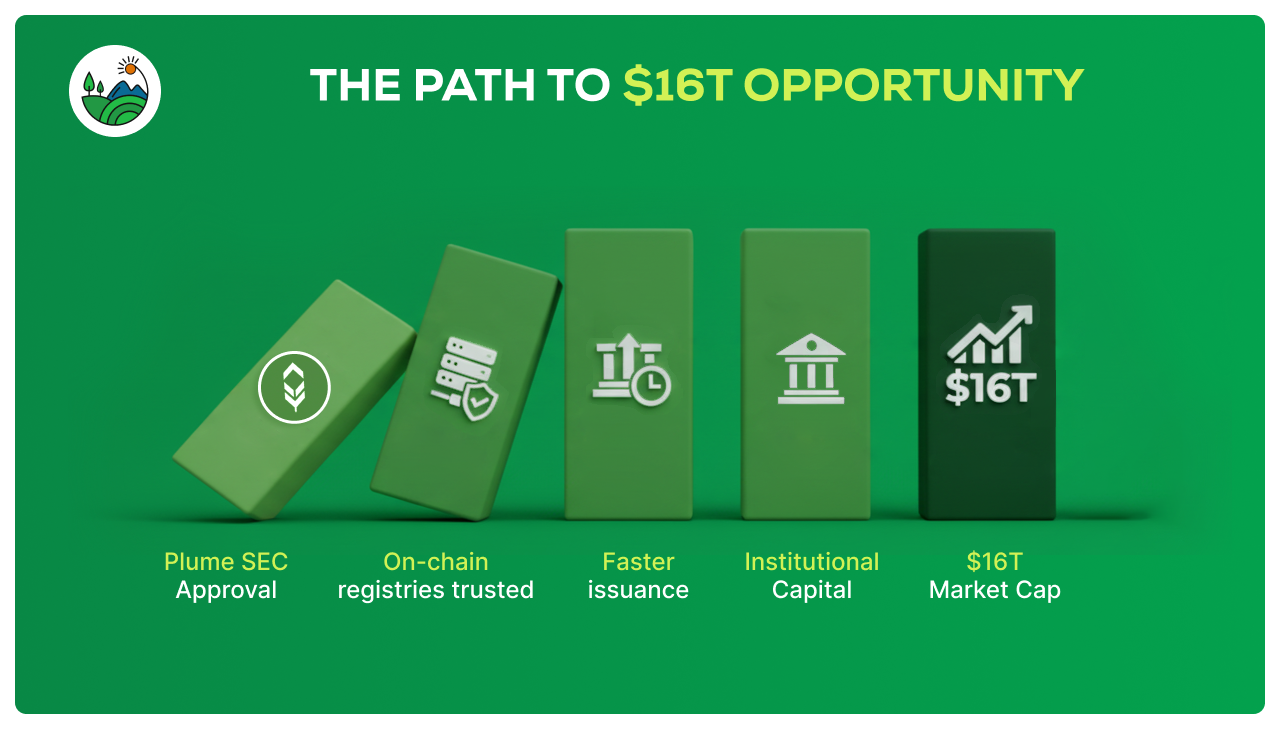
If these estimates can materialize in the days to come, RWA is well-positioned to be one of the largest markets in the world of modern finance.
Moreover, the external conditions are favoring this industry. Governments and regulators worldwide are creating proper frameworks. For instance, Asia-Pacific markets are running pilots for digital bonds and crafting standardized rules for security tokens.
These developments and the excitement of retail investors in this category build confidence that the $16T opportunity is actually very real.
How Will Landshare Benefit From This?
Landshare stands at the forefront of benefiting from this opportunity because of its early entry and real-world utility. This is very important as institutions seek new projects that have use cases that can help them capture a considerable market share.
Moreover, Landshare already operates as a compliant RWA platform. For instance, each Landshare RWA Token (LSRWA) is a security token representing fractional shares of a U.S. real estate portfolio, and buyers must pass KYC/AML checks.
The fact that regulators are now approving on-chain transfer agents shows the industry’s efforts are finally paying off. Here are some more factors that can help Landshare be one of the top RWA contenders:
1. Regulatory Credibility: Plume’s SEC status essentially means that tokenized securities can operate within established rules. Landshare’s approach aligns with these principles. So, investors can be assured that their projects sit within a legal framework designed to protect shareholders.
2. Investor Confidence: Every step toward clear regulation lifts confidence. The recently passed GENIUS Act, the SEC’s staff statements on liquid-staking, and the Trump administration’s overall outlook towards the crypto market have been fairly positive.
Similarly, Plume being approved as a SEC-registered blockchain transfer agent tells retail and institutional investors that projects like Landshare aren’t mere experiments. They’re rather a part of a regulated financial evolution.
Moreover, it means regulators see value in on-chain tokens, and that kind of signal helps legitimize the space Landshare operates in.
3. Landshare’s Own Progress: Landshare isn’t about hype. It is rather focused on delivering value from day one. The project has already sold four houses on the BNB chain. It is also providing consistent rental returns to the investors in its properties.
Moreover, the team remains focused on delivering stable, compliant returns from real estate growth.
Conclusion
So, now we know that the recent news was about more than just Plume Network being approved by the SEC to be a transfer agent. It rather has a much bigger impact on the RWA market as a whole.
While the industry continues to grow, for Landshare, it is the right time to innovate further and add more value to consumers’ lives.






